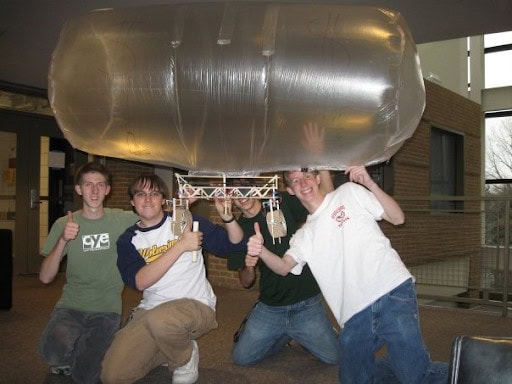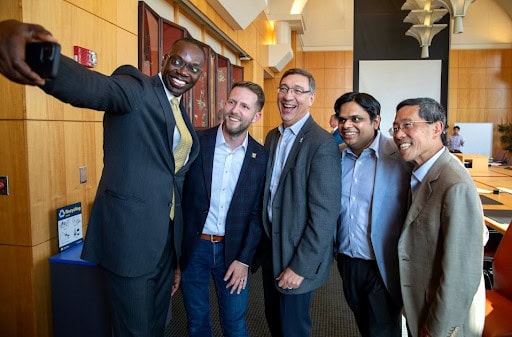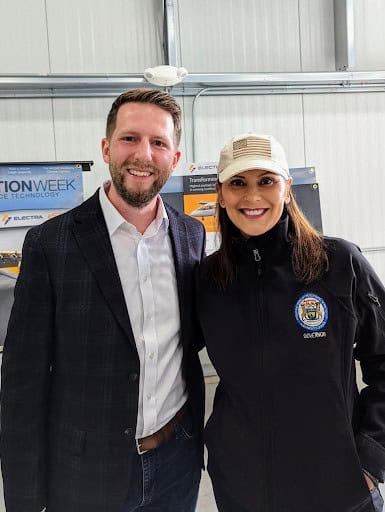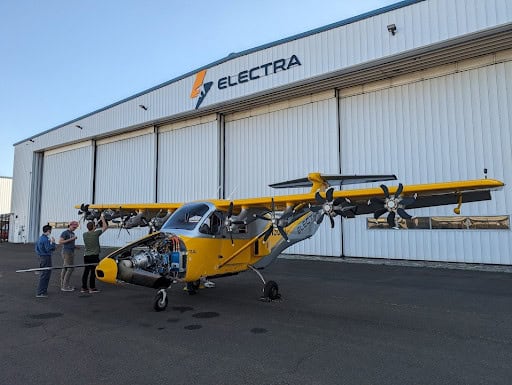
2024 Alumni Merit Award Winner Ben Marchionna Alumni Profile
State of Michigan’s Chief Innovation Ecosystem Officer reflects on his journey through the University of Michigan

State of Michigan’s Chief Innovation Ecosystem Officer reflects on his journey through the University of Michigan
Each year during homecoming weekend, the University of Michigan College of Engineering honors alumni who have made significant contributions to their departments and the industry through the Alumni Merit Award. This award celebrates distinguished alumni who personify the College of Engineering’s tradition of excellence and who have achieved remarkable accomplishments in their professional careers.
This year, the Department of Aerospace Engineering is proud to be represented by our alumni award winner: Ben Marchionna, the State of Michigan’s first-ever Chief Innovation Ecosystem Officer (CIEO) and also the Chair of the Michigan Aerospace Industrial Advisory Board (IAB). Through his dedication and innovative thinking, Ben has continued to be a pivotal member of the department through his leadership and enthusiasm for the industry.

“I’m truly honored and delighted to be receiving the U-M College of Engineering’s Alumni Merit Award,” said Ben. “My undergraduate journey shaped me for the better in countless ways. Having the opportunity to give back to Michigan Aerospace and the U-M community over the years, and now to represent our many excellent alumni through this award, is both humbling and inspiring.”
In a recent interview, Ben expressed his gratitude for his time and experiences throughout his undergraduate career. He noted how many of the opportunities he has had in his professional career have sprouted from his time at Michigan Aerospace. He also highlighted being able to work closely with Professor Carlos Cesnik, the Richard A. Auhll Department Chair, through his role as the Chair of the department’s Industrial Advisory Board (IAB). “Professor Cesnik taught me aircraft structures during my undergraduate years. He was a tremendously good teacher. It’s been especially fun and gratifying to now work with him in a professional and strategic capacity as we help shape the future of aerospace.”
Throughout his career, Ben has experienced multiple “full circle” moments where his previous ties with the university have led to exciting growth opportunities both professionally and personally. He has been involved in numerous startups, including SkySpecs, which was founded by Michigan Aerospace alumni; and Electra.aero, which has strong ties to U-M research activities.
In May 2024, Michigan Governor Gretchen Whitmer announced that Ben would be stepping into a new role as the State’s first-ever Chief Innovation Ecosystem Officer. In this role, he has been chartered to lead the supercharging of Michigan’s innovation economy, using skills he honed at U-M to build connective tissue between founders and their startups, risk capital providers, universities, corporations and the government.

In the interview below, Ben shares his journey through U-M and how his passion for aerospace and aviation has helped shape his career.
What inspired you to go into aerospace/aviation?
For as long as I can remember, I’ve been fascinated by airplanes. Some of my earliest memories are from elementary school, launching Estes Rockets off the playground. I was also captivated by Microsoft Flight Simulator and getting my first joystick. I’d set up a makeshift cockpit in our basement, with my younger siblings acting as flight attendants, handing out snacks, while I piloted the virtual flights. From that moment on, I knew that aerospace and aviation were my passions.
What drew you to U-M Aerospace?
In high school, I founded our rocket club, and as part of that experience, we participated in the Michigan Aerospace Challenge, a rocket design / build / fly competition in Muskegon. The U-M Aerospace Engineering Department’s Michigan Aeronautical Science Association (MASA) student team was there, and they launched this massive hybrid propulsion rocket, rigged with cool effects so that when it launched, it left a trail of dramatic black firework smoke. I remember thinking, ‘This is it. I’m going to Michigan to study aerospace engineering.’
That student engagement and outreach made a huge impact on me, and it really does make a difference—especially in aerospace. When you talk about aerospace projects to young kids, show them rocket launches, do paper airplane contests, or talk about going to Mars, it sparks their imagination and excitement for STEM in a way that hits different than other fields.
What faculty members left a lasting impression during your time in the Aerospace Department?
Pete Washabaugh has played a significant role in my education and career, especially through my work with SkySpecs. All the founders of SkySpecs had taken Pete’s ENGR 100 Blimp class, and it left a lasting impact on us. In 2018, while working at SkySpecs, we faced a major technical challenge, so we went back to the department to ask for Pete’s help. He brought us into his lab to examine micro cracks in the aluminum airframe components – we identified the problem and fixed it immediately. Fast forward to 2020 during the pandemic, Pete started working part-time for SkySpecs, helping with engineering design reviews and solving critical problems. He’s been indispensable and a treasured friend.
Ella Atkins is another key figure. I worked in her lab as a freshman, and I loved it so much that I continued through the summers and for the rest of my time at U-M. Ella also introduced me to AIAA. When I became AIAA President in my freshman year, she was our advisor and encouraged me to attend SciTech. I remember going to the conference with her, and she was so frugal with her lab budget that we stayed far from the conference hotel. She said, ‘If I stay here, I’ll have more money for research.’ I loved it. Her mentorship and technical brilliance have been invaluable over the years. (Ella is now the Fred D. Durham Professor and Head of the Kevin T. Crofton Aerospace and Ocean Engineering Department at Virginia Tech)
Lastly, Wei Shyy, who was the department chair at the time, was instrumental in helping me develop as a leader. As a new AIAA student leader, he supported me, took risks, and put me in positions where I could grow. Looking back, he was one of the people who truly made a difference in my journey. Wei later became President of the Hong Kong University of Science and Technology (HKUST) and Chair Professor of Mechanical and Aerospace Engineering.
How did your involvement in student organizations at U-M help shape your future career path?
Serving as President of the AIAA U-M student branch was pivotal—it opened every significant door in my career. I gained invaluable leadership experience, from managing a team to leveraging AIAA connections, all of which created a snowball effect of opportunities that started with my involvement in AIAA at Michigan.
Another influential experience was working with Solar Bubbles, a student team focused on building a solar-powered UAV. We designed a drone with high aspect ratio wings and solar panels on top. That project came full circle years later at Electra, where we developed a 90-foot wingspan solar-powered UAV called SACOS, designed to fly at 60,000 feet for extended periods. It was essentially a professional evolution of that early student project.
What is your vision of the future for our department as far as being Chair of the IAB?
The department’s direction is shaped by many factors, but most importantly by its collective faculty. As Chair of the IAB, my role is to provide the department chair, and other faculty members when needed, with insight into what’s happening in the industry and where aerospace is headed. Our goal is to help the department understand what skills and knowledge students will need to succeed in the future.
The IAB brings a broad, industry-focused perspective to help guide the department’s research and educational goals, but we’re just one piece of the puzzle. Faculty members have deep expertise in areas of fundamental research that may not have made their way into the industry yet, and it’s essential that we learn from each other.
As IAB Chair, my role is to be a thought partner to Professor Cesnik as Department Chair. We collaborate to leverage the expertise of the professionals on the IAB and the talents of the faculty, ensuring that these two groups work together and benefit from each other’s insights.
What are some of your career highlights so far?
The most meaningful part of my career has been working with incredibly smart people to solve really tough problems. At Electra, for example, we’ve tackled the challenge of building an airplane that’s never been built before—safely, with a pilot on board, and often against conventional thinking. It’s the ultimate test of innovation.

Building an innovation ecosystem across Michigan has been another highlight. I knew startups were hard, but this is just as hard! Challenging, but deeply rewarding and intellectually stimulating. At the core, this is what engineers do. We solve difficult problems by collaborating with others who are just as passionate about the work.
Looking back, any ‘first’—whether it’s a first flight or the first test or the first program launch—is always thrilling. The journey of blood, sweat and tears that goes into launching a startup, followed by the excitement of the team when you succeed, or fail, is electric. Those moments where we push boundaries and try something completely new are the most memorable. But none of it happens because of one person—it’s always about the team, working together and combining our strengths to make something incredible.
Can you explain a little bit about your position as the State’s Chief Innovation Ecosystem Officer?
I describe my role as being focused on accelerating Michigan’s innovation ecosystem in a transformative way. There are five key stakeholders in this ecosystem: startups, venture capitalists, government, corporations, and universities. These stakeholders form the fabric of any successful innovation ecosystem and talent cluster strategy.
When people think of startups, they often think of places like Silicon Valley or Boston, where early-stage researchers and talented engineers thrive, supported by smart government policies and corporate partnerships. My role is about building the connections between these five pillars here in Michigan, creating the ‘connective tissue’ that binds them together and amplifies their potential.
Michigan has all the building blocks for something truly transformative, but we need to bring these elements together in a more strategic, unified way. The state’s powerhouse universities, like the University of Michigan, play a huge role in this ecosystem, producing groundbreaking research and innovative ideas. My job is to help align these components so that they work in harmony and drive more growth for the entire state’s economy.
What advice do you have to other early career engineers or newly graduated students?
Get out of your comfort zone—early and often. Push yourself to grow in areas where you may not feel confident. If you start feeling too comfortable, you’re probably not pushing hard enough to maximize your potential. Think of your time at university as your own personal proving ground. It’s the safest place to fail because the consequences are minimal compared to what you’ll face later in your career. Use that time to experiment and take risks. Failure is a powerful teacher, and it helps build confidence.
Another key piece of advice is to never be afraid to ask questions, even if you think they make you look inexperienced. The more questions you ask, the more confident you’ll become, not just in understanding complex concepts, but also in vocalizing your interests and ambitions. Don’t try to fit into someone else’s mold—create your own path. Everyone’s career trajectory is different, so while it’s important to seek advice from mentors, remember that their advice is based on their own experiences. Survey a variety of trusted mentors, test their advice, and then make decisions that are right for you.
The aerospace and aviation industry today is unlike anything we’ve seen before. While it’s important to respect the advice of professors and advisors, keep in mind that they might not have encountered the same opportunities and challenges that exist now. In this fast-evolving industry, you truly have to carve your own path.